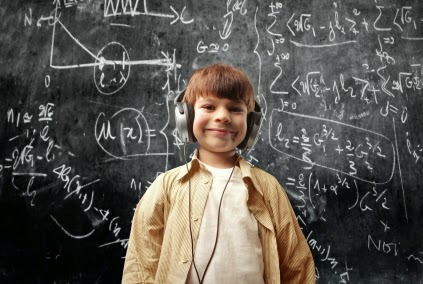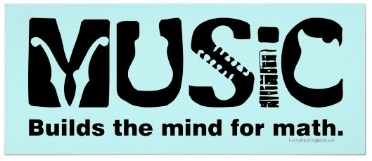Please feel free to comment about it and share your opinion.
Mathematics has been used for centuries to describe, analyze and create music. There are two main observations to be made about how Math structures music. The first fact is that pitches and sounds could be described as combinations of frequencies, which are related to the physical properties of an instrument (An example of this is the lenght of a vibrating string in a gitar or a piano).
The second main observation is that music consists (mainly) on secuences or patterns of sounds or melodies, and the musician can give a shape to this secuences to make a song.
To better explain this concept, we can look at the octaves in music. The definition of octane could be explained as the interval between a tone that is eight diatonic degrees above or below another tone or as the interval between any two frequencies having a ratio of 2 to 1.
No musical notes fit together better than those which are one octave apart, for instance, pairs of notes like middle C and high C. Mathematically, the frequency of the higher note in the pair is exactly double that of the lower note. Since octaves of any note in music are denoted by the same letter, it would show for example that the frecuencies 110, 220, 330, and 440 are all A´s in a piano keyboard.
Often in a symphony, one instrument would play a note one octave above that of another instrument, creating a melody together.
After the octave, the most natural combination of notes occurs when the frecuencies are in a ratio of 3:2, in which case the notes are said to be a fifth apart.
 |
| The keyboard of the piano, showing us the structure of the octanes. |
Math also can explain the pitch of a note, why does it produce a high sound instead of a low sound, which is due to the vibration of the chord. We can predict mathematically the sound that we will produce by making the chord X long and Y tense. (Being X and Y values for each component).
Video with a representation of the frecuency and pitch on a guitar chord.
So after all, Math do helps with the description and structure of music and many other things that help the melody, such as the Timbre, the Harmonics, the Amplitude or the Sine Waves, so we can all agree that apart from creating the tones and melody Math helps humongously in the creation of music.
Here I have some links to internet webs that go deeper into this theory:
Math behind Music.
More MbM.
Even More MbM.
 But perhaps mathematics and music are not as closely related as we think. The clich´e ‘math and music go together’ is memorable for its seeming contradiction: how could a field that appears (to many people) "cold", "heartless", and abstract apply to something as enjoyable, emotional, and accessible as music? Recently, cognitive psychologist Daniel Levitin argued that musical talent is not inherently linked to mathematical ability. He studied people with Williams syndrome who are often proficient musicians, yet incapable of doing mathematics (they typically have the intellectual ability of a young child). Levitin’s research is intriguing because the idea that mathematics and music are intimately connected has been widely accepted for centuries. Music, along with astronomy, was one of the first subjects to which mathematics was applied. The Pythagoreans’ discovery that vibrating strings whose lengths form simple ratios produce pleasing harmonies as a compelling demonstration of the ubiquity of mathematics. The core mathematics curriculum in medieval universities included music. Musical notation, is inherently geometrical.
But perhaps mathematics and music are not as closely related as we think. The clich´e ‘math and music go together’ is memorable for its seeming contradiction: how could a field that appears (to many people) "cold", "heartless", and abstract apply to something as enjoyable, emotional, and accessible as music? Recently, cognitive psychologist Daniel Levitin argued that musical talent is not inherently linked to mathematical ability. He studied people with Williams syndrome who are often proficient musicians, yet incapable of doing mathematics (they typically have the intellectual ability of a young child). Levitin’s research is intriguing because the idea that mathematics and music are intimately connected has been widely accepted for centuries. Music, along with astronomy, was one of the first subjects to which mathematics was applied. The Pythagoreans’ discovery that vibrating strings whose lengths form simple ratios produce pleasing harmonies as a compelling demonstration of the ubiquity of mathematics. The core mathematics curriculum in medieval universities included music. Musical notation, is inherently geometrical.But how can a musician with no understanding of math be able to create a melody just by learning the basics of music language? Could it be because Music is a mathematical language on its own or could it be that they are not as related as we thought they are?
It may sound unreasonable after reading so many facts in favor of music being connected to mathematics, but at the same time, we have to ask ourselves whether we think that our favourite melody/song is just a secuence of frecuencies, if it is in fact a masterpiece worth listening a million times or if it is both.









0 comments:
Post a Comment